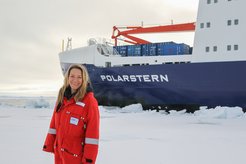
Sustainability and the oceans - how polar and marine life respond to anthropogenic impact
Sustainability Lecture by Antje Boetius
25 Feb 2021 | Time: 5:00-6:30 pm | Virtual Lecture |
Speaker: Antje Boetius | MPI for Marine Microbiology
Recording available on MPSN ownCloud - access restricted registered MPSN members only. You are not yet MPSN member? Register here for the Max Planck Sustainability Network.

This presentation summarizes recent observations of change in polar and deep-sea ecosystems, and discusses strategies and rationales for including the unknown realms of Earth in sustainable development goals, including what science can do to minimize footprints.
Together, the cryosphere and deep-sea cover the majority of the Earth’s surface, and provide important functions for this planet’s habitability, including a buffer against warming and a sink for excess CO2. They comprise a vast, yet uncharted diversity of habitats and life, by far exceeding continental biodiversity and genetic resources. However, polar and deep-sea ecosystems are remote and hardly accessible due to their physical conditions we call “extreme”. In the absence of adequate observational capacities, our scientific knowledge on the evolution, distribution, dynamics and functioning of polar and deep-sea ecosystems is still meager. We lack ecological baselines and have not yet defined essential variables nor ecological indicators to observe, assess and manage polar and ocean health. There is already substantial evidence of human footprints including climate change impacts, pollution and destructive use of resources in the most remote areas of Earth. Considering the observed and predicted speed of environmental changes, clear targets are needed for international policies and commitments to prevent irreversible shifts and losses. This presentation summarizes recent observations of change and impacts on polar and deep-sea ecosystems, and discusses conceptual strategies and rationales for including the unknown realms of Earth in sustainable development goals. It presents ideas and requirements for minimizing footprints of industrial uses of the ocean, and shows what is needed that science could do better in sustainable research.
